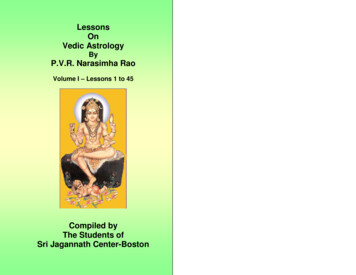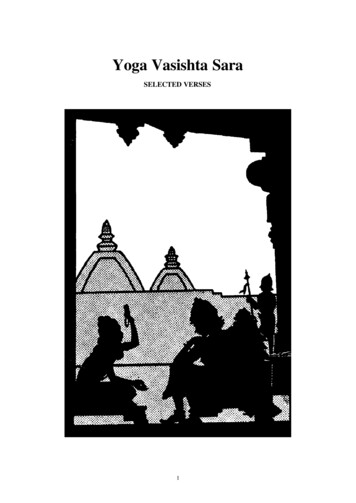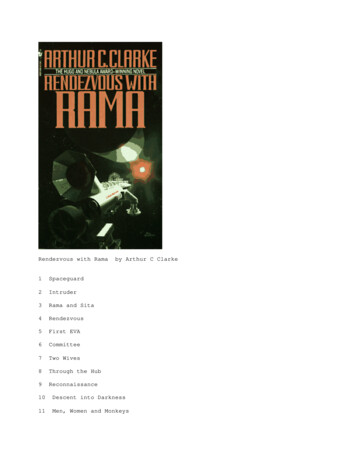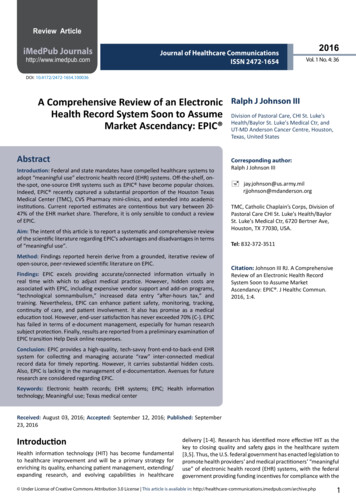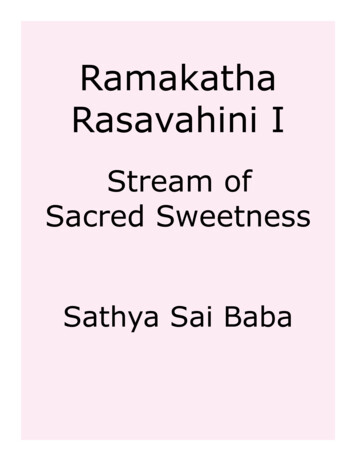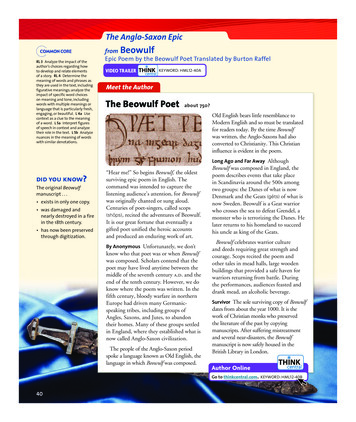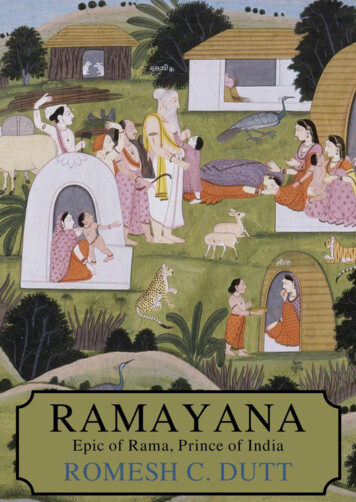
Transcription
The RamayanaCondensed into English VersebyRomesh C. DuttTo The Right Hon. Professor F. Max MullerWho has devoted his lifetime to the elucidation of the learning,literature, and religion of ancient India and has recognised andvindicated what is true and great and ennobling in modern Indiathis translation of the Ramayana is dedicated as a sincere token ofthe esteem and regard of my countrymen.
3ContentsA Note on the Late Romesh C. DuttBibliographyBook I. Sita-Swayamvara (The Bridal of Sita)I. Ayodhya, the Righteous CityII. Mithila, and the Breaking of the BowIII. The Embassy to AyodhyaIV. Meeting of Janak and Dasa-rathaV. The PreparationVI. The WeddingVII. Return to AyodhyaBook II. Vana-Gamana-Adesa (The Banishment)I. The Council ConvenedII. The People ConsultedIII. The City DecoratedIV. IntrigueV. The Queen’s DemandVI. The King’s LamentVII. The SentenceBook III. Dasa-ratha-Viyoga (The Death of the King)I. Woman’s LoveII. Brother’s Faithfulness
4III. Mother’s BlessingsIV. Citizens’ LamentV. Crossing the Tamasa: the Citizens’ ReturnVI. Crossing the Ganges, Bharad-vaja’s HermitageVII. Crossing the Jumna – Valmiki’s HermitageVIII. Tale of the Hermit’s SonBook IV. Rama-Bharata-Sambada (The Meeting of the PrincesI. The Meeting of the BrothersII. Bharat’s Entreaty and Rama’s ReplyIII. Kausalya’s Lament and Rama’s ReplyIV. Jabali’s Reasoning and Rama’s ReplyV. The SandalsVI. The Hermitge of AtriBook V. Panchavati (On the Banks of the Godavari)I. The Hermitage of AgastyaII. The Counsel of AgastyaIII. The Forest of PanchavatiIV. Winter in PanchavatiBook VI. Sita-Harana (Sita Lost)1. Surpa-nakha in LoveII. Surpa-nakha PunishedIII. Rama’s DepartureIV. Lakshman’s Departure
5V. Ravan’s ComingVI. Ravan’s WooingVII. Ravan’s TriumphBook VII. Kishkindha (In the Nilgiri Mountains )I. Friends in MisfortuneII. The Counsel of TaraIII. The Fall of BaliIV. The Consecration of SugrivaV. The Rains in the Nilgiri MountainsVI. The Quest for SitaBook VIII. Sita-Sandesa (Sita Discovered)I. Sita in the Asoka GardenII. The Voice of HopeIII. Rama’s TokenIV. Sita’s TokenBook IX. Ravana-Sabha (The Council of War)I. Ravan Seeks AdviceII. Prahasta’s SpeechIII. Durmukha’s SpeechIV. Vajra-danshtra’s SpeechV. Speech of Nikumbha and Vajra-hanuVI. Bibhishan’s WarningVII. Kumbha-karna’s Determination
6VIII. Indrajit’s AssuranceIX. Ravan’s DecisionX. Bibhishan’s DepartureBook X. Yuddha (The War in Ceylon)I. Indrajit’s First Battle – The Serpent-NooseII. Sita’s LamentIII. Ravan’s First Battle – The Javelin-StrokeIV. Fall of Kumbha-karnaV. Indrajit’s Sacrifice and Second BattleVI. Indrajit’s Third Battle and FallVII. Ravan’s LamentVIII. Ravan’s Second Battle and VengeanceIX. Rama’s LamentX. Celestial Arms and ChariotXI. Ravan’s Third Battle and FallXII. Mandodari’s Lament and the FuneralsBook XI. Rajya-Abhisheka (Rama’s ConsecrationI. Ordeal by FireII. Woman’s Truth VindicatedIII. Return Home by the Aërial CarIV. GreetingsV. The Consecration
7Book XII. Aswa-Medha (Sacrifice of the Horse)I. The SacrificeII. Valmiki and His PupilsIII. Recital of the RamayanaIV. Lava and Kusa RecognisedV. Sita LostConclusionEpilogue by the Translator
8A Note on the Late Romesh C. Dutt[ix] Romesh Chunder Dutt, to whom English readers are indebted for thecondensed metrical versions of the ancient Indian epics given in this volume,was one of the most distinguished sons of modem India. He came of a Hindufamily standing high among the Kayasths, second of the great castes in Bengal,was born in 1848, and grew to manhood amid influences of deep spiritualdisturbance. In those days an Indian youth who had felt the call of the Westencountered the sternest opposition, from both his own family and thecommunity, if he avowed his ambition of making the voyage to Europe.Romesh Dutt, having passed through the Presidency College, Calcutta, took hisfate into his own hands. Accompanied by two friends, both of whom afterwardsrose to eminence in Bengal, he secretly took ship, came to London, entered forthe Indian Civil Service, and took third place in the open examination of 1869.He was the first of his race to attain the rank of divisional commissioner, andlong before his retirement in 1897, at the end of twenty-five years’ service, hadmade a high reputation as an administrator. He sat for a time in the BengalLegislative Council, and, in recognition of his official work, received theCompanionship of the Indian Empire. He died on November 30, 1909, atBaroda, the capital of the important Native State which he had served withbrilliant success as revenue minister and dewan.The influences which determined his literary activity were [x] primarilyEuropean. As a student in Calcutta he had made acquaintance with the Englishclassics, and later, while at University College, had read the poets insatiably.Nevertheless his first successes were achieved in his mother tongue. He wrote inBengali poems and plays, historical and social novels, and aroused a storm ofprotest within the orthodox community of his province by publishing a Bengalitranslation of the Rig Veda.In English, of which he had complete mastery, his first considerable essay was ahistory of Civilisation in Ancient India, which, though not a work of originalresearch, fulfilled a useful purpose in its day. When freedom from Governmentservice gave him the opportunity he set himself to writing the Economic Historyof India and India in the Victorian Age, the two together forming his chiefcontribution to the subject which he, more than any other Indian of his time, hadmade his own. In these books, as in others of kindred theme and purpose, thereis much criticism of British administration, strongly felt if temperatelyexpressed. Apart from this, its more controversial side, the work of RomeshDutt is valuable mainly in that it has helped to reveal, to his own people no lessthan to ours, the spiritual riches of ancient India.S. K. Ratcliffe
9Bibliography[xi] The following is a list of the various editions of “The Ramayana”:“The Ramayana,” edited by S. Goressio (with Italian translation). 10 vols. 184358, 1859-60 (Calcutta), 1888 (Bombay).English translations: by Kirtee Bass. 5 vols. Serampore, 1802. “The Ramayuna ofValmeeki, in the original Sungscrit, with a Prose Translation and ExplanatoryNotes.” W. Carey and J. Marshman. 1806-10.An English translation for “Nirvachanothara Ramayanum” (i.e. the “UttaraRamayana” attributed to Vúlmíki, with Commentary). Madras. 1880.Free English translation by R. T. H. Griffith. 5 vols. 1870-75.Translation into English Prose. Edited by Manmatha Nath Dutt. 1889. 1892-94.Condensed into English Verse by Romesh Dutt. 1899 (Temple Classics). 1900.Works on:Sir M. Williams, “Indian Epic Poetry. with full Analysis of the Ramayana andMahabharata.” 1863.J. T. Wheeler, “History of India.” 1867, &c.J. C. Oman, “Struggles of the Dawn. the Stories of the Great Indian Epics,Ramayana,” &c. 1893. “The Great Indian Epics,” &c. 1894, 1899 (Bohn).The following is a list of the various editions of “The Maha-Bharata”:Complete edition, Calcutta, 1834-39, 4 vols.; Bombay, 1863: re-edited, withcommentary by Nitakantha Govinda, 1890.[xii] Translations into English Prose, by Protap Chandra Roy, 1883: (Sanscrittext of Maharshi Vyas, with complete English and Hindi translations, 1902. &c.).“Virtue’s Triumph; or, The Mahâ-Bhârata.” By Rai Bahadur, P. Anunda Charlu.1894.Prose literal translation, by Manmatha Nath Dutt. 1895.Condensed into English verse by Romesh Dutt (Temple Classics). 1898. Thesame, with Introduction by W. Max-Muller. 1899.
Bibliography - 10(Many English translations of portions of the whole epic havebeen published.)Works on:H. H. Wilson, “Essays on the Religion of the Hindoos.” 1862.Sir M. Williams, “Indian Epic Poetry,” &c. 1863.Wheeler, “The Vedic Period and the Mahabharata.” 1867.Buehler and Kirste, “Indian Studies, Contributions to the History of theMahabharata.” 1892.J. C. Oman (see above).V. Fausboll, “Indian Mythology, according to the Mahabharata in Outline”(Oriental Religions Series, Luzac, vol. i.). 1903.“Rāgānāma Ramkrishna Bhāguvata.” an attempt to analyse the Mahabharatafrom the higher Brahminical standpoint. 1905.Chintāmani Vināyaka Vaidya, “The Mahabharata; a Criticism.” 1905. “EpicIndia; or, India as described in the Mahabharata and Ramayana.” 1907.
11Ramayana, Epic of Rama, Prince of IndiaBook I. Sita-Swayamvara(The Bridal of Sita)[1] The Epic relates to the ancient traditions of two powerful races, the Kosalasand the Videhas, who lived in Northern India between the twelfth and tenthcenturies before Christ. The names Kosala and Videha in the singular numberindicate the kingdoms, – Oudh and North Behar, – and in the plural number theymean the ancient races which inhabited those two countries.According to the Epic, Dasa-ratha king of the Kosalas had four sons, the eldestof whom was Rama the hero of the poem. And Janak king of the Videhas had adaughter named Sita, who was miraculously born of a field furrow, and who isthe heroine of the Epic.Janak ordained a severe test for the hand of his daughter, and many a prince andwarrior came and went away disappointed. Rama succeeded, and won Sita. Thestory of Rama’s winning his bride, and of the marriage of his three brothers withthe sister and cousins of Sita, forms the subject of this Book.The portions translated in this Book form Section vi., Sections lxvii. to lxix.,Section lxxiii., and Section lxxvii. of Book i. of the original text.I. Ayodhya, the Righteous City[2] Rich in royal worth and valour, rich in holy Vedic lore,Dasa-ratha ruled his empire in the happy days of yore,Loved of men in fair Ayodhya, sprung of ancient Solar Race,Royal rishi in his duty, saintly rishi in his grace,Great as INDRA in his prowess, bounteous as KUVERA kind,Dauntless deeds subdued his foemen, lofty faith subdued his mind!Like the ancient monarch Manu, father of the human race,Dasa-ratha ruled his people with a father’s loving grace,Truth and Justice swayed each action and each baser motive quelled,People’s Love and Monarch’s Duty every thought and deed impelled,And his town like INDRA’S city, – tower and dome and turret brave –Rose in proud and peerless beauty on Sarayu’s limpid wave!
I. The Bridal of Sita - 12Peaceful lived the righteous people, rich in wealth in merit high,Envy dwelt not in their bosoms and their accents shaped no lie,Fathers with their happy households owned their cattle, corn and gold,Galling penury and famine in Ayodhya had no hold,Neighbours lived in mutual kindness helpful with their ample wealth,None who begged the wasted refuse, none who lived by fraud and stealth!And they wore the gem and earring, wreath and fragrant sandal paste,And their arms were decked with bracelets, and their necks with nikshas graced,Cheat and braggart and deceiver lived not in the ancient town,Proud despiser of the lowly wore not insults in their frown,[3] Poorer fed not on the richer, hireling friend upon the great,None with low and lying accents did upon the proud man wait!Men to plighted vows were faithful, faithful was each loving wife,Impure thought and wandering fancy stained not holy wedded life,Robed in gold and graceful garments, fair in form and fair in face,Winsome were Ayodhya’s daughters, rich in wit and woman’s grace!Twice-born men were free from passion, lust of gold and impure greed,Faithful to their Rites and Scriptures, truthful in their word and deed,Altar blazed in every mansion, from each home was bounty given,Stooped no man to fulsome falsehood, questioned none the will ofHeaven.Kshatras bowed to holy Brahmans, Vaisyas to the Kshatras bowed,Toiling Sudras lived by labour, of their honest duty proud,To the Gods and to the Fathers, to each guest in virtue trained,Rites were done with due devotion as by holy writ ordained.Pure each caste in due observance, stainless was each ancient rite,And the nation thrived and prospered by its old and matchless might,And each man in truth abiding lived a long and peaceful life,With his sons and with his grandsons, with his loved and honoured wife.Thus was ruled the ancient city by her monarch true and bold,As the earth was ruled by Manu in the misty days of old,
I. The Bridal of Sita - 13Troops who never turned in battle, fierce as fire and strong and brave,Guarded well her lofty ramparts as the lions guard the cave.Steeds like INDRA’S in their swiftness came from far Kamboja’s land,From Vanaya and Vahlika and from Sindhu’s rock-bound strand,[4] Elephants of mighty stature from the Vindhya mountains came,Or from deep and darksome forests round Himalay’s peaks of fame,Matchless in their mighty prowess, peerless in their wondrous speed,Nobler than the noble tuskers sprung from high celestial breed.Thus Ayodhya, “virgin city,” – faithful to her haughty name, –Ruled by righteous Dasa-ratha won a world-embracing fame,Strong-barred gates and lofty arches, tower and dome and turret high,Decked the vast and peopled city fair as mansions of the sky.Queens of proud and peerless beauty born of houses rich in fame,Loved of royal Dasa-ratha to his happy mansion came,Queen Kausalya blessed with virtue true and righteous Rama bore,Queen Kaikeyi young and beauteous bore him Bharat rich in lore,Queen Sumitra bore the bright twins, Lakshman and Satrughna bold,Four brave princes served their father in the happy days of old!II. Mithila, and the Breaking of the BowJanak monarch of Videha spake his message near and far, –He shall win my peerless Sita who shall bend my bow of war, –Suitors came from farthest regions, warlike princes known to fame,Vainly strove to wield the weapon, left Videha in their shame.Viswa-mitra royal rishi, Rama true and Lakshman bold,Came to fair Mithila’s city from Ayodhya famed of old,Spake in pride the royal rishi: “Monarch of Videha’s throne,Grant, the wondrous bow of RUDRA be to princely Rama shown.”[5] Janak spake his royal mandate to his lords and warriors bold;“Bring ye forth the bow of RUDRA decked in garlands and in gold,”And his peers and proud retainers waiting on the monarch’s call,Brought the great and goodly weapon from the city’s inner hall.
I. The Bridal of Sita - 14Stalwart men of ample stature pulled the mighty iron carIn which rested all-inviolate Janak’s dreaded bow of war,And where midst assembled monarchs sat Videha’s godlike king,With a mighty toil and effort did the eight-wheeled chariot bring.“This the weapon of Videha,” proudly thus the peers begun,“Be it shewn to royal Rama, Dasa-ratha’s righteous son,”“This the bow,” then spake the monarch to the rishi famed of old,To the true and righteous Rama and to Lakshman young and bold,“This the weapon of my fathers prized by kings from age to age,Mighty chiefs and sturdy warriors could not bend it, noble sage!Gods before the bow of RUDRA have in righteous terror quailed,Rakshas fierce and stout Asuras have in futile effort failed,Mortal man will struggle vainly RUDRA’S wondrous bow to bend,Vainly strive to string the weapon and the shining dart to tend,Holy saint and royal rishi, here is Janak’s ancient bow,Shew it to Ayodhya’s princes, speak to them my kingly vow!”Viswa-mitra humbly listened to the words the monarch said,To the brave and righteous Rama, Janak’s mighty bow displayed,Rama lifted high the cover of the pond’rous iron car,Gazed with conscious pride and prowess on the mighty bow of war.[6] “Let me,” humbly spake the hero, “on this bow my fingers place,Let me lift and bend the weapon, help me with your loving grace,”“Be it so,” the rishi answered, “be it so,” the monarch said,Rama lifted high the weapon on his stalwart arms displayed,Wond’ring gazed the kings assembled as the son of Raghu’s raceProudly raised the bow of RUDRA with a warrior’s stately grace,Proudly strung the bow of RUDRA which the kings had tried in vain,Drew the cord with force resistless till the weapon snapped in twain!Like the thunder’s pealing accent rose the loud terrific clang,And the firm earth shook and trembled and the hills in echoes rang,
I. The Bridal of Sita - 15And the chiefs and gathered monarchs fell and fainted in their fear,And the men of many nations shook the dreadful sound to hear!Pale and white the startled monarchs slowly from their terror woke,And with royal grace and greetings Janak to the rishi spoke:“Now my ancient eyes have witnessed wond’rous deed by Rama done,Deed surpassing thought or fancy wrought by Dasa-ratha’s son,And the proud and peerless princess, Sita glory of my house,Sheds on me an added lustre as she weds a godlike spouse,True shall be my plighted promise, Sita dearer than my life,Won by worth and wond’rous valour shall be Rama’s faithful wife!Grant us leave, O royal rishi, grant us blessings kind and fair,Envoys mounted on my chariot to Ayodhya shall repair,They shall speak to Rama’s father glorious feat by Rama done,They shall speak to Dasa-ratha, Sita is by valour won,They shall say the noble princes safely live within our walls,They shall ask him by his presence to adorn our palace halls!”[7] Pleased at heart the sage assented, envoys by the monarch sent,To Ayodhya’s distant city with the royal message went.III. The Embassy to AyodhyaThree nights halting in their journey with their steeds fatigued and spent,Envoys from Mithila’s monarch to Ayodhya’s city went,And by royal mandate bidden stepped within the palace hall,Where the ancient Dasa-ratha sat with peers and courtiers all,And with greetings and obeisance spake their message calm and bold,Softly fell their gentle accents as their happy tale they told.“Greetings to thee, mighty monarch, greetings to each priest and peer,Wishes for thy health and safety from Videha’s king we bear,Janak monarch of Videha for thy happy life hath prayed,And by Viswa-mitra’s bidding words of gladsome message said:
I. The Bridal of Sita - 16‘Known on earth my plighted promise, spoke by heralds near and far, –He shall win my peerless Sita who shall bend my bow of war, –Monarchs came and princely suitors, chiefs and warriors known to fame,Baffled in their fruitless effort left Mithila in their shame,Rama came with gallant Lakshman by their proud preceptor led,Bent and broke the mighty weapon, he the beauteous bride shall wed!Rama strained the weapon stoutly till it snapped and broke in twain,In the concourse of the monarchs, in the throng of arméd men,Rama wins the peerless princess by the righteous will of Heaven,I redeem my plighted promise – be thy kind permission given![8] Monarch of Kosala’s country! with each lord and peer and priest,Welcome to Mithila’s city, welcome to Videha’s feast,Joy thee in thy Rama’s triumph, joy thee with a father’s pride,Let each prince of proud Kosala win a fair Videha-bride!’These by Viswa-mitra’s bidding are the words our monarch said,This by Sata-nanda’s counsel is the quest that he hath made.”Joyful was Kosala’s monarch, spake to chieftains in the hall,Vama-deva and Vasishtha and to priests and Brahmans all:“Priests and peers! in far Mithila, so these friendly envoys tell,Righteous Rama, gallant Lakshman, in the royal palace dwell,And our brother of Videha prizes Rama’s warlike pride,To each prince of proud Kosala yields a fair Videha-bride,If it please ye, priests and chieftains, speed we to Mithila fair,World-renowned is Janak’s virtue, Heaven-inspired his learning rare!”Spake each peer and holy Brahman: “Dasa-ratha’s will be done!Spake the king unto the envoys: “Part we with the rising sun!”Honoured with a regal honour, welcomed to a rich repast,Gifted envoys from Mithila day and night in gladness passed!
I. The Bridal of Sita - 17IV. Meeting of Janak and Dasa-rathaOn Ayodhya’s tower and turret now the golden morning woke,Dasa-ratha girt by courtiers thus to wise Sumantra spoke:“Bid the keepers of my treasure with their waggons lead the way,Ride in front with royal riches, gold and gems in bright array,[9] Bid my warriors skilled in duty lead the four-fold ranks of war,Elephants and noble chargers, serried foot and battle-car,Bid my faithful chariot-driver harness quick each car of state,With the fleetest of my coursers, and upon my orders wait.Vama-deva and Vasishtha versed in Veda’s ancient lore,Kasyapa and good Jabali sprung from holy saints of yore,Markandeya in his glory, Katyayana in his pride,Let each priest and proud preceptor with Kosala’s monarch ride,Harness to my royal chariot strong and stately steeds of war,For the envoys speed my journey and the way is long and far.”With each priest and proud retainer Dasa-ratha led the way,Glittering ranks of forces followed in their four-fold dread array,Four days on the way they journeyed till they reached Videha’s land,Janak with a courteous welcome came to greet the royal band.Joyously Videha’s monarch greeted every priest and peer,Greeted ancient Dasa-ratha in his accents soft and clear:“Hast thou come, my royal brother, on my house to yield thy grace,Hast thou made a peaceful journey, pride of Raghu’s royal race?Welcome! for Mithila’s people seek my royal guest to greet,Welcome! for thy sons of valour long their loving sire to meet,Welcome too the priest Vasishtha versed in Veda’s ancient lore,Welcome every righteous rishi sprung from holy saints of yore!And my evil fates are vanquished and my race is sanctified,With the warlike race of Raghu thus in loving bonds allied,
I. The Bridal of Sita - 18Sacrifice and rites auspicious we ordain with rising sun,Ere the evening’s darkness closes, happy nuptials shall be done!”Thus in kind and courteous accents Janak spake his purpose high,And his royal love responding, Dasa-ratha made reply:[10] “Gift betokens giver’s bounty, – so our ancient sages sing, –And thy righteous fame and virtue grace thy gift, Videha’s king!World-renowned is Janak’s bounty, Heaven-inspired his holy grace,And we take his boon and blessing as an honour to our race!”Royal grace and kingly greetings marked the ancient monarch’s word,Janak with a grateful pleasure Dasa-ratha’s answer heard,And the Brahmans and preceptors joyously the midnight spent,And in converse pure and pleasant and in sacred sweet content.Righteous Rama gallant Lakshman piously their father greet,Duly make their deep obeisance, humbly touch his royal feet,And the night is filled with gladness for the king revered and old,Honoured by the saintly Janak, greeted by his children bold,On Mithila’s tower and turret stars their silent vigils keep,When each sacred rite completed, Janak seeks his nightly sleep.V. The PreparationAll his four heroic princes now with Dasa-ratha stayedIn Mithila’s ancient city, and their father’s will obeyed,Thither came the bold Yudhajit prince of proud Kaikeya’s line,On the day that Dasa-ratha made his gifts of gold and kine,And he met the ancient monarch, for his health and safety prayed,Made his bow and due obeisance and in gentle accents said:“List, O king! my royal father, monarch of Kaikeya’s race,Sends his kindly love and greetings with his blessings and his grace,[11] And he asks if Dasa-ratha prospers in his wonted health,If his friends and fond relations live in happiness and wealth.Queen Kaikeyi is my sister, and to see her son I came,Bharat prince of peerless virtue, worthy of his father’s fame,
I. The Bridal of Sita - 19Aye, to see that youth of valour, by my royal father sent,To Ayodhya’s ancient city with an anxious heart I went,In the city of Mithila, – thus did all thy subjects say, –With his sons and with his kinsmen Dasa-ratha makes his stay,Hence in haste I journeyed hither, travelling late and early dawn,For to do thee due obeisance and to greet my sister’s son!”Spake the young and proud Kaikeya, dear and duly-greeted guest,Dasa-ratha on his brother choicest gifts and honours pressed.Brightly dawned the happy morning, and Kosala’s king of fameWith his sons and wise Vasishtha to the sacred yajna came,Rama and his gallant brothers decked in gem and jewel bright,In th’ auspicious hour of morning did the blest Kautuka rite,And beside their royal father piously the princes stood,And to fair Videha’s monarch spake Vasishtha wise and good:“Dasa-ratha waits expectant with each proud and princely son,Waits upon the bounteous giver, for each holy rite is done,’Twixt the giver and the taker sacred word is sacred deed,Seal with gift thy plighted promise, let the nuptial rites proceed!”Thus the righteous-souled Vasishtha to Videha’s monarch prayed,Janak versed in holy Vedas thus in courteous accents said:“Wherefore waits the king expectant? Free to him this royal dome,Since my kingdom is his empire and my palace is his home,And the maidens, flame-resplendent, done each fond Kautuka rite,Beaming in their bridal beauty tread the sacrificial site![12] I beside the lighted altar wait upon thy sacred hest,And auspicious is the moment, sage Vasishtha knows the rest,Let the peerless Dasa-ratha, proud Kosala’s king of might,With his sons and honoured sages enter on the holy site,Let the righteous sage Vasishtha, sprung from Vedic saints of old,Celebrate the happy wedding; be the sacred mantras told!”
I. The Bridal of Sita - 20VI. The WeddingSage Vasishtha skilled in duty placed Videha’s honoured king,Viswa-mitra, Sata-nanda, all within the sacred ring,And he raised the holy altar as the ancient writs ordain,Decked and graced with scented garlands grateful unto gods and men,And he set the golden ladles, vases pierced by artists skilled,Holy censers fresh and fragrant, cups with sacred honey filled,Sanka bowls and shining salvers, arghya plates for honoured guest,Parchéd rice arranged in dishes, corn unhusked that filled the rest,And with careful hand Vasishtha grass around the altar flung,Offered gift to lighted AGNI and the sacred mantra sung!Softly came the sweet-eyed Sita, – bridal blush upon her brow,–Rama in his manly beauty came to take the sacred vow,Janak placed his beauteous daughter facing Dasa-ratha’s son,Spake with father’s fond emotion and the holy rite was done:“This is Sita child of Janak, dearer unto him than life,Henceforth sharer of thy virtue, be she, prince, thy faithful wife,[13] Of thy weal and woe partaker, be she thine in every land,Cherish her in joy and sorrow, clasp her hand within thy hand,As the shadow to the substance, to her lord is faithful wife,And my Sita best of women follows thee in death or life!”Tears bedew his ancient bosom, gods and men his wishes share,And he sprinkles holy water on the blest and wedded pair.Next he turned to Sita’s sister, Urmila of beauty rare,And to Lakshman young and valiant spake in accents soft and fair:“Lakshman, dauntless in thy duty, loved of men and Gods above,Take my dear devoted daughter, Urmila of stainless love,Lakshman, fearless in thy virtue, take thy true and faithful wife,Clasp her hand within thy fingers, be she thine in death or life!”
I. The Bridal of Sita - 21To his brother’s child Mandavi, Janak turned with father’s love,Yielded her to righteous Bharat, prayed for blessings from above:“Bharat, take the fair Mandavi, be she thine in death or life,Clasp her hand within thy fingers as thy true and faithful wife!”Last of all was Sruta-kriti, fair in form and fair in face,And her gentle name was honoured for her acts of righteous grace,“Take her by the hand, Satrughna, be she thine in death or life,As the shadow to the substance, to her lord is faithful wife!”Then the princes held the maidens, hand embraced in loving hand,And Vasishtha spake the mantra, holiest priest in all the land,And as ancient rite ordaineth, and as sacred laws require,Stepped each bride and princely bridegroom round the altar’s lightedfire,Round Videha’s ancient monarch, round the holy rishis all,Lightly stepped the gentle maidens, proudly stepped the princes tall![14] And a rain of flowers descended from the sky serene and fair,And a soft celestial music filled the fresh and fragrant air,Bright Gandharvas skilled in music waked the sweet celestial song,Fair Apsaras in their beauty on the green sward tripped along!As the flowery rain descended and the music rose in pride,Thrice around the lighted altar every bridegroom led his bride,And the nuptial rites were ended, princes took their brides away,Janak followed with his courtiers, and the town was proud and gay!VII. Return to AyodhyaWith his wedded sons and daughters and his guard in bright array,To the famed and fair Ayodhya, Dasa-ratha held his way,And they reached the ancient city decked with banners bright and brave,And the voice of drum and trumpet hailed the home-returning brave,Fragrant blossoms strewed the pathway, song of welcome filled the air,Joyous men and merry women issued forth in garments fair,
I. The Bridal of Sita - 22And they lifted up their faces and they waved their hands on high,And they raised the voice of welcome as their righteous king drew nigh.Greeted by his loving subjects, welcomed by his priests of fame,Dasa-ratha with the princes to his happy city came,With the brides and stately princes in the town he held his way,Entered slow his lofty palace bright as peak of Himalay.Queen Kausalya blessed with virtue, Queen Kaikeyi in her pride,Queen Sumitra sweetly loving, greeted every happy bride,[15] Soft-eyed Sita noble-destined, Urmila of spotless fame,Mandavi and Sruta-kirti to their loving mothers came.Decked in silk and queenly garments they performed each pious rite,Brought their blessings on the household, bowed to Gods of holy might,Bowed to all the honoured elders, blest the children with their love,And with soft and sweet endearment by their loving consorts moved.Happy were the wedded princes peerless in their warlike might,And they dwelt in stately mansions like KUVERA’s mansions bright,Loving wife and troops of kinsmen, wealth and glory on them wait,Filial love and fond affection sanctify their happy fate.Once when on the palace chambers bright the golden morning woke,To his son the gentle Bharat, thus the ancient monarch spoke:“Know, my son, the prince Kaikeya, Yudhajit of warlike fame,
the sister and cousins of Sita, forms the subject of this Book. The portions translated in this Book form Section vi., Sections lxvii. to lxix., Section lxxiii., and Section lxxvii. of Book i. of the original text. I. Ayodhya, the Righteous City [2]
